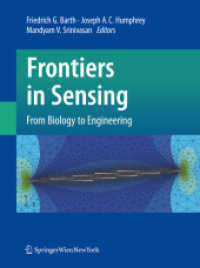- ホーム
- > 洋書
- > 英文書
- > Politics / International Relations
Full Description
"Overall, this is the best political science research methods book I've seen."-William Field, Rutgers UniversityBuilding students' analytic abilities and developing their statistical reasoning with new data, fresh exercises, and engaging examples, this accessible introduction to the essential elements of political analysis walks students through the basics-measuring concepts, describing variables, formulating and testing hypotheses, controlling for alternative explanations, and interpreting graphic displays, and nearly 50 practical exercises motivate them to use their new skills with confidence.New to this edition:All examples updated with current data sourcesTreatment of visual depictions of variables and relationships and enhanced coverage of logistic regressionA total of 48 end-of-chapter exercises, many new or completely revisedMore accessible discussion of spurious, additive, and interaction relationshipsCoverage of box plots and error bar chartsNew discussion of ways to represent probabilities in logistic regression
Contents
IntroductionWhat This Book Is AboutFacts and Values in PerspectiveThe Scientific ApproachConclusionChapter 1: The Definition and Measurement of ConceptsConceptual DefinitionsOperational DefinitionsSummaryKey TermsExercisesChapter 2: Measuring and Describing VariablesMeasuring VariablesDescribing VariablesSummaryKey TermsExercisesChapter 3: Proposing Explanations, Framing Hypotheses, and Making ComparisonsProposing ExplanationsFraming HypothesesMaking ComparisonsGraphing Relationships and Describing PatternsSummaryKey TermsExercisesChapter 4: Research Design and the Logic of ControlExperimental DesignsControlled ComparisonsThree ScenariosSummaryKey TermsExercisesChapter 5: Making Controlled ComparisonsCross-tabulation AnalysisGraphing Controlled ComparisonsAn Example of InteractionMean Comparison AnalysisSummaryKey TermsExercisesChapter 6: Foundations of Statistical InferencePopulation Parameters and Sample StatisticsRandom SamplingThe Standard Error of a Sample MeanInference Using the Normal DistributionInference Using the Student's t-DistributionWhat About Sample Proportions?SummaryKey TermsExercisesChapter 7: Tests of Significance and Measures of AssociationStatistical SignificanceMeasures of AssociationSummaryKey TermsExercisesChapter 8: Correlation and Linear RegressionCorrelationBivariate RegressionR-squareDummy Variable RegressionMultiple RegressionSummaryKey TermsExercisesChapter 9: Logistic RegressionThe Logistic Regression ApproachFinding the Best Fit: Maximum Likelihood EstimationLogistic Regression with Multiple Independent VariablesWorking with Probabilities: MEMs and MERsSummaryKey TermsExercisesChapter 10: Thinking Empirically, Thinking ProbabilisticallyThinking EmpiricallyThinking Probabilistically








